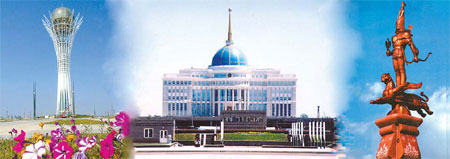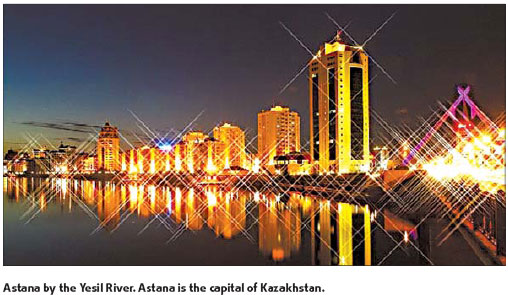Kazakhstan: Treasure trove of Asia
 |
| Landmarks of Kazakhstan: (from left to right) Bayterek Tower; Ak Orda, the presidential residence; and the Symbol of Independence |
Its territory covers 2.72 million sq km, making it the ninth largest nation in the world. It borders China (1,460 km), Kyrgyzstan (980 km), Turkmenistan (380 km), Uzbekistan (2,300 km) and Russia (6,467 km), total length of its borders being 12,187 km.
The country stretches from the low reaches of the River Volga in the West to the foothills of the Altai mountains in the East, for some 3,000 km (a distance spanning two time zones), and from the West Siberian lowlands in the North to the desert of Kyzylkum and the mountain range of Tianshan in the South for some 2,000 km.

As of January 1, 2007, Kazakhstan's population was 15.4 million, with density as high as 5.5 persons per sq km.
The Kazakh capital is Astana (since December 10, 1997), which has a population of 600,000 as of January 1, 2007.
Kazakh is the official language. However, in state institutions and local administrative bodies, Russian is also spoken quite officially. The state also creates conditions for promoting the languages of other ethnic minorities.
The monetary unit is tenge, which is equal to 100 tyins. It was introduced on November 15, 1993.
December 16 is Independence Day, a national holiday in the Republic of Kazakhstan.
Economy
Kazakhstan possesses various mineral resources. It occupies first place in the world in prospected supplies of zinc, tungsten and barite, the second place in silver, lead and chromites, third place in copper and fluorite, fourth place in molybdenum and the sixth place in gold.
Kazakhstan ranks first in supplies of chrome ore and lead among the countries of the Commonwealth of Independent States (CIS), second in oil, silver, copper, manganese, zinc, nickel and phosphoric raw materials and third in gas, coal, gold and tin.
In silver, chromites, lead and zinc mining, Kazakhstan ranks first amongst the CIS countries. It ranks the second in oil, coal, copper, nickel and phosphate raw materials mining, and third in gold mining. Kazakhstan's abundant supplies of oil and gas concentrated in the western region have helped the country enter the ranks of the largest oil-producing states in the world.
Kazakhstan is expected to exploit 67 million tons of oil in 2007 and 140 million tons in 2015.
In the past seven years, its gross domestic product (GDP) has grown nearly 10 percent annually on average.
The country's GDP amounted to $80.5 billion in 2006, up 10.6 percent over the previous year, while the per capita GDP reached $5,200, up 40 percent. The GDP is expected to rise to $100 billion in 2007 and $300 billion in 2015, while per capita GDP is projected to grow to $7,000 in 2007, matching the Russian level.
In the first half of this year, Kazakhstan boosted its foreign trade to $36.6 billion, including $14.8 billion worth of imports and $21.8 billion in exports.
Its sound international reputation makes Kazakhstan an attractive destination for foreign investors. Kazakhstan was the first among CIS countries to pass regional investment evaluations, which are regularly elevated and confirmed. The World Bank has listed Kazakhstan as one of the top 20 places with highest investment value. In 2006 alone, the country absorbed $6.6 billion in direct investment from 80 countries to boost its national economy.
The financial market is the fastest developing sector in the Kazakh economy. In 2006, the country provided $38.8 billion in loans to the economic sector, 16 times as much as in 2000.
Despite its remarkable economic achievements, Kazakhstan has realized that sustainable economic growth will only rely on progress in the non-raw material sectors. Under the national program of developing "30 corporate leaders", the country has focused on 79 breakthrough projects. The state will cooperate with individuals to implement breakthrough programs.
Kazakhstan is located in the hinterland of the Eurasian continent, its geographical position giving it great potential in the cross-border transportation business. The country's transportation facilities comprise railways, airlines, shipping, river transportation, pipeline delivery, highway and telecommunication networks. Kazakhstan has 14,500 km of railways, which transport most commodities across the country. Highways under operation stretch 83,300 km, while shipping routes go along the Caspian Sea, passing Aktau and Bautino ports to Iran and Azerbaijan.
Politics
Kazakhstan made a breakthrough to become a democracy in May 2007. As a result of amendments and revisions of its constitution, Kazakhstan now has a substantially new political structure.
Having amended and revised the constitution, the Majilis, or the lower house of the Kazakh parliament, deliberated to accelerate the pace of constitutional reform by dissolving voluntarily.
And, through the summer of 2007, domestic political life largely focused on activities preparing for elections to the parliament and Maslikhats, the local representative bodies. The conclusions of these should serve as an indication of how the people of Kazakhstan view the amendments to the constitution and the country's policies as a whole. Under the new election system that meets international standards, an open, transparent and fair election was held on August 18, 2007. All political parties participated in the process. The election process summed up the effects of the constitutional reform and promoted the establishment of a more balanced and democratic political system. About 65 percent of the electorate took part in the election. Such a high proportion illustrates significant improvement in people's political and cultural awareness.
Kazakhstan is set to have a one-party parliament following the election. The Nur Otan Party, headed by President Nursultan Nazarbayev, won a resounding 88 percent of the votes and took up 98 seats in parliament. The six other parties contesting the election were unable to clear the 7-percent threshold needed to take up seats in the lower house. With the Nur Otan Party, Kazakhstan is expected to enjoy a stable political situation, comfortable life and bustling social and economic conditions.
Most foreign observers believed the election was free from any serious and fundamental offenses against the law. International observers noted that the Kazakh Majilis special election and Maslikhats routine election were rightful, in keeping with its assured international obligations.
On August 20, nine Majilis deputies from the Assembly of the People of Kazakhstan, a unique mechanism for inter-ethnic harmony, were elected for the first time in the country's history. The parliament now comprises delegates of various ethnic groups across the country.
(China Daily 10/15/2007 page6)














